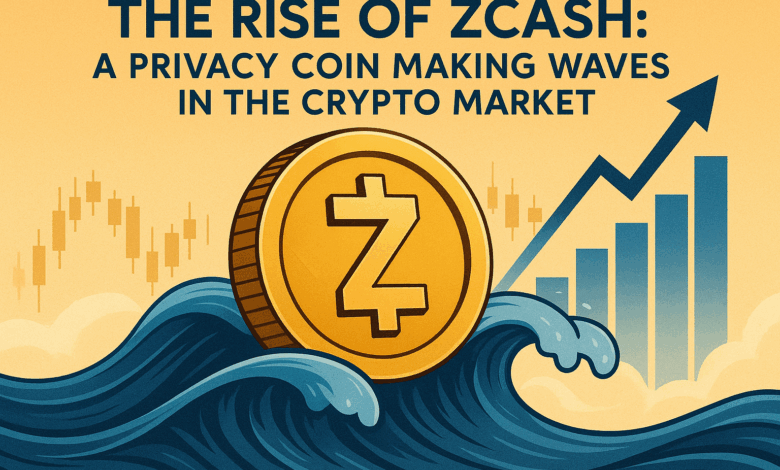A Privacy Coin Making Waves in the Crypto Market

Introduction: Zcash Defies the Noise and Surges in Value
In a digital landscape dominated by volatile meme coins, speculative tokens, and the endless competition among Ethereum alternatives, one project continues to rise quietly yet powerfully: Zcash (ZEC). While not grabbing headlines like its more flamboyant counterparts, Zcash has been building undeniable momentum. Over the last several months, ZEC has demonstrated a consistent uptick in both price action and trading volume, sparking renewed interest from both seasoned institutional investors and independent retail traders.
This resurgence isn’t based on hype or celebrity endorsements—but grounded in something with long-term value: privacy. Zcash has been positioning itself as a pillar of financial discretion in a world increasingly under digital surveillance. This contrarian play has quietly become a favorite of informed, strategic investors—the kind of minds that spot fundamental value before the masses catch on.
Why Zcash’s Privacy Focus Appeals to Smart Capital
Zcash was designed from day one with privacy at its core. Leveraging advanced cryptography through zero-knowledge proofs (zk-SNARKs), Zcash allows users to choose whether their transactions are publicly visible or completely shielded. While most blockchains expose user activity on a public ledger, Zcash puts control back into the hands of the individual—offering a level of optional privacy that is both versatile and forward-thinking.
This flexibility attracts a diverse range of stakeholders. From developers in restrictive regimes seeking financial freedom, to high-net-worth individuals and businesses who understand the ramifications of transparent smart contracts, Zcash offers a distinct solution. Unlike Bitcoin and Ethereum, where transaction histories are permanent and fully traceable, Zcash introduces true fungibility—the concept that every unit of currency is interchangeable and indistinguishable, a crucial trait for any asset aspiring to function as money.
Importantly, Zcash accomplishes this without the overt ideological baggage that often encumbers the privacy space. It presents a rational, compliant form of privacy-centered finance that is palatable even to regulatory-conscious institutional buyers. This design choice brings an edge that very few privacy coins have achieved: being both technologically progressive and regulatory-aware.
Zcash vs Other Privacy Coins: Monero and Beyond
In the privacy coin arena, comparisons are frequently drawn between Zcash and other popular tokens such as Monero (XMR), Secret Network (SCRT), Dash (DASH), and emerging players like Dero (DERO). While each offers its own flavor of privacy, Zcash’s configurable approach makes it stand out.
Monero, for example, enforces privacy by default for every transaction. While this holds philosophical appeal to privacy purists, it also heightens scrutiny from regulators, limiting its adoption in mainstream settings. Zcash, on the other hand, offers selective disclosure—a feature allowing users to maintain privacy when necessary, but also provide transparency when required. This duality allows Zcash to navigate the complex line between user rights and corporate compliance.
Moreover, Zcash’s technology continues to evolve. Shielded transactions can now be carried out seamlessly on mobile wallets—bringing user-centric utility to the masses. Meanwhile, the anticipated Halo upgrade promises something revolutionary: recursive zk-SNARKs without a trusted setup. This opens the door for a more decentralized future and enhanced cross-chain capabilities. Future upgrades may allow for Ethereum Virtual Machine (EVM) compatibility, positioning Zcash not just as a privacy coin, but as a plug-and-play privacy layer for the exploding world of DeFi and Web3 applications.
Zcash in the Broader Crypto Context
Privacy is not just a niche feature anymore—it is fast becoming a necessity. With governments around the globe accelerating the development of Central Bank Digital Currencies (CBDCs), the prospect of state-level financial surveillance looms large. The innate transparency of public blockchains, once heralded as a positive, is now being re-evaluated. Investors are beginning to ask: who should have access to your transaction data?
This is where Zcash begins to look less like an alternative and more like an essential infrastructure layer. As mainstream crypto enters a mature phase with greater integration into traditional finance and regulation, privacy-preserving technologies like those used by ZEC are likely to form the bedrock of responsible, secure digital economies. Institutions that once dismissed privacy-centric tools are now reconsidering their utility—not for illicit use, but for protecting trade secrets, customer data, and internal operations.
And unlike many altcoins that pivot at every market whim, Zcash has remained true to its original mission while embracing innovation and adaptation. This unique combination offers durability in a market where attention spans are short and narratives shift overnight.
Future Outlook: The Double-Edged Sword of Privacy
There’s no denying that the privacy crypto segment lives under a cloud of regulatory uncertainty. Governments in the U.S., Europe, and Asia are ramping up scrutiny related to anonymity on the blockchain, citing concerns about transparency, anti-money laundering (AML), and illicit activities. But Zcash may hold one of the market’s best strategic positions in this environment.
With its nuanced architecture and ability to be both private and transparent, Zcash offers a unique regulatory hedge. Its future Proof-of-Stake (PoS) transition not only opens the door to staking rewards for holders but also makes the network more energy-efficient and aligned with environmental narratives. Combined with plans to integrate more robust smart contract capabilities and interchain bridges, Zcash is queuing up to become far more than just a privacy token—it is transforming into a foundational layer for privacy-enabled decentralized finance.
Should a global turning point in financial privacy occur—whether driven by excessive surveillance, hack vulnerability, or simply consumer demand for discretion—Zcash stands to benefit enormously. The asymmetric upside here is undeniable: while regulatory risks exist, the trajectory of digital financial sovereignty suggests privacy will become a feature rather than a flaw.
Investment Strategies: Playing the Privacy Curve
Given the growing awareness of privacy’s importance and Zcash’s technological roadmap, a number of investment strategies could prove effective for different types of investors:
- Accumulation Strategy: Long-term believers in ZEC’s trajectory can view current prices as a historical discount. Use a dollar-cost averaging (DCA) approach to gradually build exposure, especially during pullbacks or accumulation phases.
- Pair Trades: In a market driven by momentum and narrative cycles, consider long ZEC / short high-flying L1s as a hedge. This contrarian play banks on a pivot back toward fundamental assets with lasting utility, like privacy.
- Staking Preparation: With the shift to PoS on the horizon, ZEC staking could become a new passive income stream. Early positioning before exchanges or protocols offer staking services could unlock additional upside.
- Regulatory Risk Hedging: Construct a diversified privacy portfolio anchored with ZEC. Complement positions with smaller allocations in tokens like Secret Network (SCRT), Dero (DERO), and emerging zero-knowledge native platforms. ZEC’s balance of privacy and compliance positions it as lower risk within this niche.
- DeFi Integration Watch: Monitor developments in Zcash’s integration into the DeFi ecosystem. As Ethereum compatibility improves, ZEC could become a powerful collateral asset for privacy-preserving lending, borrowing, and yield farming.
Rather than chasing the latest pump or meme-fueled narrative, smarter investors are rotating into assets with long-term viability. Zcash offers exposure to a critical and underappreciated frontier in blockchain—one that could play a defining role in shaping the future of decentralized finance and sovereign digital money.
Conclusion: Privacy Is Not Dead — It’s Undervalued
Every crypto cycle has its own overlooked champions. As we climb deeper into the current bull market, the real narrative could shift—from speculation and noise to security, scalability, and privacy. In this reevaluation of fundamentals, Zcash (ZEC) holds a unique position as both a technological pioneer and a policy-conscious innovator.
With clear plans for staking, deeper Web3 interoperability, mobile accessibility, and user sovereignty, Zcash is no longer just a privacy coin—it’s becoming a full-fledged blockchain platform with purpose and conviction. As trusted institutions begin to reckon with the consequences of global surveillance and data breaches, assets that offer compliant privacy like Zcash could rapidly move from the periphery into the mainstream.
For investors willing to dig beneath the hype and identify projects solving real-world problems, ZEC represents one of the most overlooked and potentially rewarding investments of this cycle. Privacy is not a vulnerability—it’s a competitive edge. And with Zcash, that edge is sharpening.
Source link





